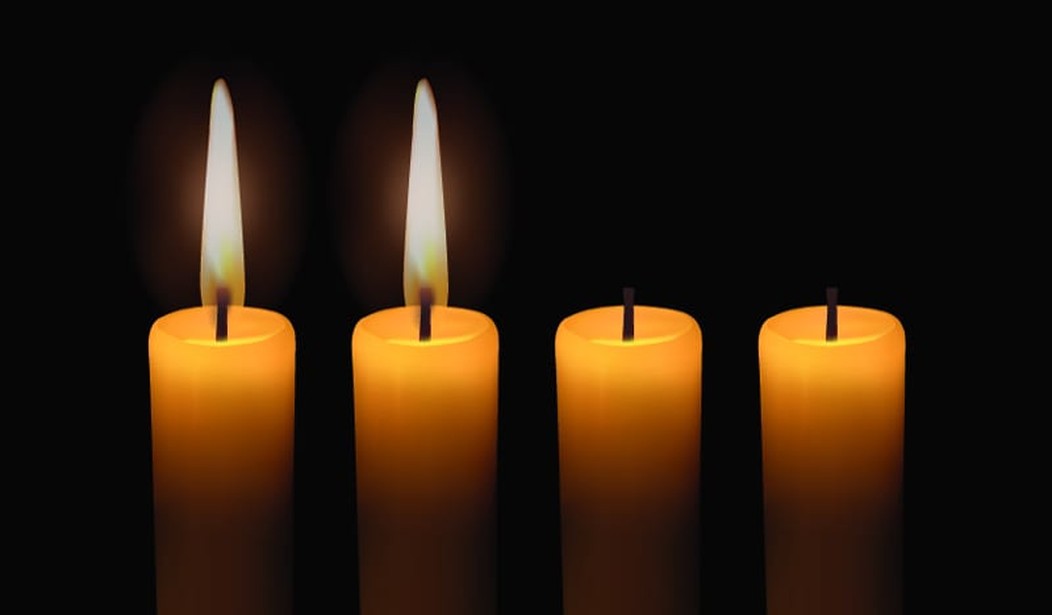The second Sunday of Advent this year coincides with the first day of Hanukkah. As I have written before, the Jewish “Festival of Lights” has some serious thematic parallels with Advent’s happy message of a new light coming to the world, a light unto both Gentiles and Jews alike. And this week both Catholics and many mainline Protestants will read, as their Old Testament lesson, Baruch 5:1-9, which ends with “God will lead Israel with joy, in the light of his glory, with the mercy and righteousness that come from him.”
The metaphor of “light” is, however, far from the only parallel, spiritually speaking, between Hanukkah and Advent. Sudden light amidst darkness is, of course, revelatory – but both observances involve more than revelations of new truth. Both involve not just revelation but deliverance, not mere celebration but also a purifying rededication.
As many Christians may not be adequately familiar with the story behind Hanukkah, some review is in order. The brutal Syrian King Antiochus IV had his armies butcher Jews and despoil the Temple. A rural family, led militarily by Judas Maccabee, gathered the Jewish remnant into the wilderness to form a force that, against all odds, evicted the Syrians in 165 B.C. As described in Wikipedia (not the most authoritative source, but one often containing the most understandable summations), Judah Maccabee “ordered the Temple to be cleansed, a new altar to be built in place of the polluted one and new holy vessels to be made.” But as they began their task of re-purification by lighting the traditional seven-candled menorah, they found only enough oil to burn for one day – but, miraculously, the oil lasted eight days, until new oil could be prepared. Hence the now-familiar 8-day celebration.
But Hanukkah – literally translated as “dedication” – was not the end of the story, by far. It was merely the first step. As described at the definitive online Jewish site Chabad, “a return to normal living had not yet come. Israel could not yet afford to relax; it would have to stand ready and prepare to carry on the fight ….”
(And, as described in the Apocrypha’s Book of Maccabees and in several other historical sources, the job of keeping Jerusalem free, its Temple holy, would continue for years.)
Likewise, in what is for many Protestant churches the “canticle” appointed for this particular Sunday (used this Sunday in place of a traditional Psalm), Luke’s “Song of Zechariah” features the father of John the Baptist describing the mission of the coming “savior” as one, first, of deliverance:
“…to set us free from the hands of our enemies, free to worship him without fear, holy and righteous in his sight.”
Yet it was not a deliverance that will be effected immediately. It was a deliverance for which the people must “prepare.” In the Old Testament, Malachi wrote: “See, I am sending my messenger to prepare the way before me.” Isaiah likewise wrote of “the voice of one crying out in the wilderness: ‘Prepare the way of the Lord, make his paths straight; every valley shall be filled, and every mountain and hill shall be made low’….” (Baruch as well reported that “God has ordered that every high mountain and the everlasting hills be made low, and the valleys filled up, to make level ground, so that Israel may walk safely in the glory of God.”)
The preparation demanded by John the Baptist was not merely a matter of hopeful anticipation, nor of mere spiffing up one’s abode as if preparing for a houseguest. Instead, in every account, and with emphasis, John called for a preparation that involved repentance. And, as we know from Webster’s dictionary, to repent is to “turn” from sin and, specifically, to “dedicate oneself to the amendment of one’s life.”
The repentance of Advent is thus, literally, a “hanukkah,” a “dedication” to a renewed, and better understood, way of the Lord.
Without that renewed dedication or hanukkah, Advent is meaningless. God gives us the miracle of a new and lasting light unto the world only after we have purified our spirit, our inner Temple – “a Temple to be cleansed…and new holy vessels to be made.”
Quin Hillyer is a veteran conservative columnist. He has an undergraduate degree in Theology from Georgetown University and has served for years in various forms of ecumenical lay leadership.









Join the conversation as a VIP Member